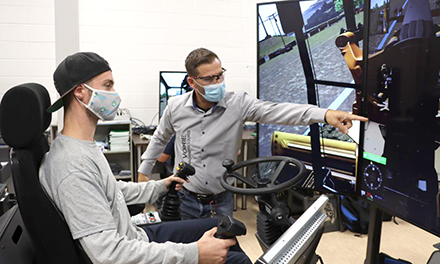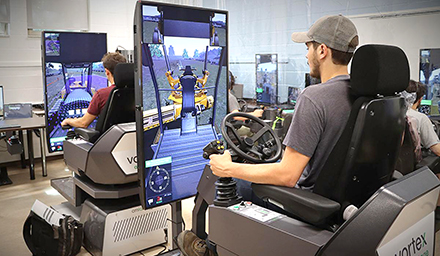CM Lab Simulations, developer of Vortex training simulators, has released a case study about one of Quebec Canada’s leading forestry training institutions. Mont-Laurier offers comprehensive instruction on skills such as tree-felling to operation and maintenance of harvest, loading, transport, and road construction equipment. Source: Timberbiz
Having accumulated a variety of simulators over the years, Mont-Laurier has recognized their value for training. However, because most of their simulators no longer reflected the advanced controls, automation, or dynamics of today’s forestry equipment, they were seeking to purchase new simulators. The organization needed simulators that would evolve with their curriculum.
The training school selected CM Labs Vortex Simulators after conducting field tests, realizing that not all simulators are the same.
After issuing a public tender and evaluating different options, Mont-Laurier concluded that CM Labs offered the most comprehensive solution with respect to realism, curriculum, affordability, and support.
Vortex simulators reduced the learning curve by up to a week compared with previous instructional methods. With a firm understanding of the equipment behaviour and controls, Mont-Laurier students move to field training with more hours to focus on technique. The results are accelerated learning and more confident and better prepared operators.
As one of Quebec, Canada’s six forestry training centres, the Mont-Laurier Vocational School helps prepare a new generation of heavy equipment operators. The non-profit centre collaborates with the region’s timber companies to provide students with practical hands-on experience including three months of field training alongside instructors in working logging camps.
With a wide variety of equipment at its disposal, (harvesters, loaders, service trucks, simulators, and more) the school offers comprehensive instruction ranging from tree-felling to the operation and maintenance of harvest, loading, transport, and road construction equipment.
In the past, learning to run heavy equipment was generally an on-the-job mentoring process handed down from one generation of operator to the next. But even under the most experienced supervision, learning to control sophisticated equipment in the field is often intimidating and ineffective, and always dangerous. What’s more, with a labor shortage and the high cost invested in an operator, companies find it increasingly difficult to justify pulling a productive worker off the job for training purposes.
Despite the ongoing call for new recruits, enrolment remains low. And because many who enter the program are from urban settings and unfamiliar with the forestry environment, anxiety can take its toll.
The answer lies in removing the fear and danger associated with putting trainees too quickly behind the controls on a jobsite. An instrumental part of the solution, heavy equipment simulators allow students to learn in a stress-free and safe environment while bridging the gap from the classroom to the field.






